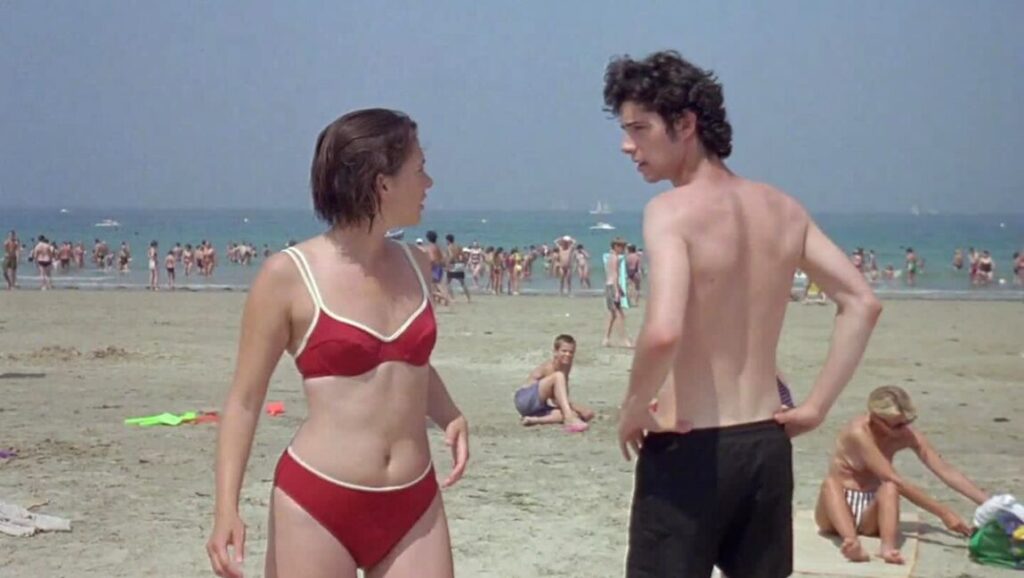Some of Eric Rohmer’s sharpest skewerings of male psychology take as their focus guys defined by disjunctions between appearance and intention — take, for instance, the exceedingly suave manipulator in Claire’s Knee, or the willfully standoffish oaf from La Collectionneuse who nonetheless craves affection. In this regard, Melvil Poupaud’s Gaspard, from A Summer’s Tale, is one of Rohmer’s most poignantly contradictory creations. “I don’t enjoy observing people,” he broods at one point, yet the first thing he does once settled in for vacation in seaside Brittany — where he’ll spend the rest of the film wasting time between college pursuits — is hurry out to the boardwalk to people-watch. Later, when someone offers the optimistic conjecture that “everyone is interesting in their way,” Gaspard retorts, “on their own, yes, but not in a group” — a silly comment if one recalls his jumping at the opportunity to go clubbing the night before. Funniest of all is when one of Gaspard’s three romantic options looks to be making a clean break from him: he grabs her by the shoulder, says “don’t go,” then recoils in the opposite direction once she humors him. In a way, Gaspard, a curly-haired, long-faced, Jarmuschian twig, has set himself an impossible behavioral challenge: to narcissistically harp on his woes to any and all willing ears while also carefully monitoring his own self-image, making certain it aligns with whatever persona might impress his counterpart. Frequently darting his eyes away from interactions he’s engaged in (sometimes to scout for the wandering gazes of the girls he’s stringing along, other times to make sure no one’s noticed his awkwardness), Gaspard is rarely fully present in any social exchange. Instead, he’s always working some angle, whether it’s the fulfillment of an immediate desire, an attempt to redirect the natural flow of conversation, or even using his listener as a mere net to catch his wayward mental ramblings.
Summer flings with promiscuous babes might seem like frivolous material for a director approaching his eighth decade, but in Rohmer’s hands, a gentle lark becomes a wise lament structured around the eternal conflict between living in the moment and biding time for some hypothetical, ideal future.
Of course, Gaspard’s inconsistencies and deficiencies can’t sneak by his director, and Rohmer characteristically doesn’t miss a beat. His unaffected style recalls what Bazin once said of Erich von Stroheim’s direction: “Take a close look at the world, keep on doing so, and in the end it will lay bare for you all its cruelty and ugliness,” only in Rohmer’s case one must substitute “comedy and tragedy.” The Cahiers veteran, a spry 76 when A Summer’s Tale was released, only moves his camera when his characters move, eliminating all expressivity to stare calmly and directly at his romantically entangled youngsters. But that’s not to say that his visual decisions lack variety. Generally the choice of a shared framing or a solo shot is of distinct significance, as when Gaspard’s early wanderings with the sprightly Margot (Amanda Langlet) register in affectionate two-shots the intimacy to which Gaspard is oblivious. By contrast, Gaspard’s most pitiable moment features him isolated in a roomy medium shot against an overcast ocean vista, an image that reconfigures the sea — so beloved by this clumsy romantic with his shanties and piratesses — as a somber omen. As for the few group scenes, Rohmer sustains attention on his main characters without even necessarily visually emphasizing them. The aforementioned clubbing outing, for example, plays out in a stationary wide shot held long enough to allow the viewer to detect complicated psychological dynamics rippling wordlessly across the dancing bodies. Summer flings with promiscuous babes might seem like frivolous material for a director approaching his eighth decade, but in Rohmer’s hands, a gentle lark becomes a wise lament structured around the eternal conflict between living in the moment and biding time for some hypothetical, ideal future.
Part of Kicking the Canon – The Film Canon.


Comments are closed.